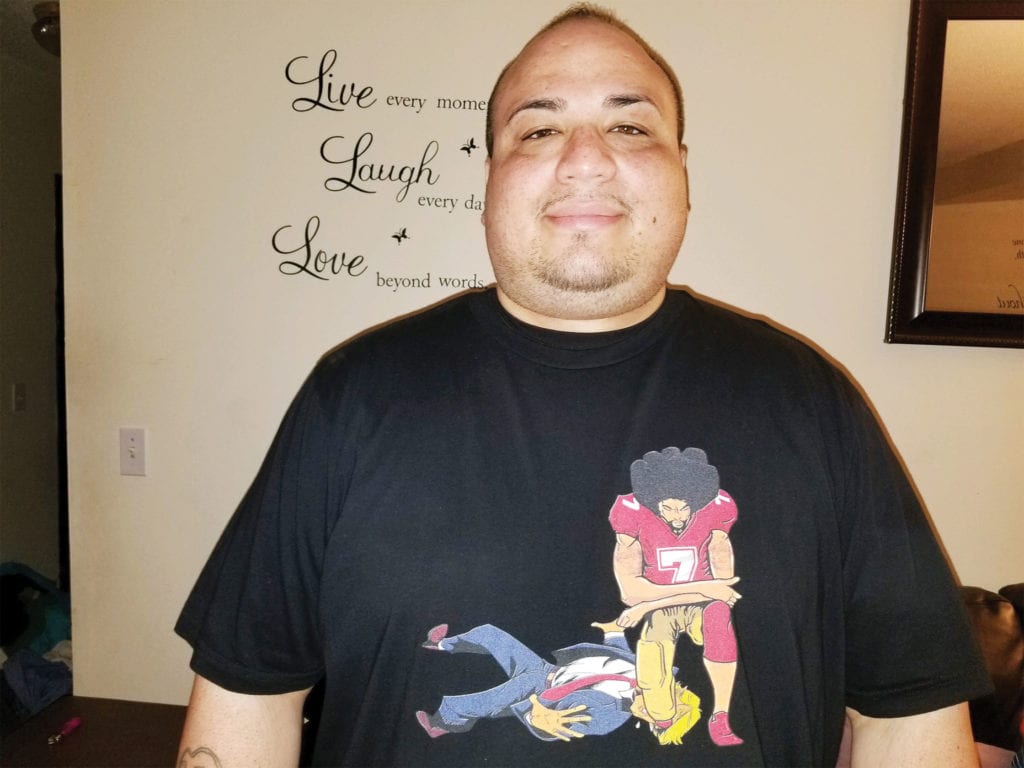
Calvin Feliciano was looking forward to attending a spiritual retreat on an island in British Columbia when he picked his luggage off a carousel at Vancouver International Airport. He wasn’t expecting to be detained and questioned about his gang record.
But when Canadian police officers approached him, took his luggage and placed him in handcuffs, it was the start of a 14-hour ordeal that ended in his being deported back to the United States. Feliciano, who grew up in Boston’s Villa Victoria public housing development and had a series of arrests from when he was 12 years old in 1997 until 2003, said he was questioned repeatedly about his involvement in a gang.
“They said, ‘What’s the name of your gang? Who’s the leader? What’s the knowledge of the gang?’” Feliciano told the Banner.
The officers showed Feliciano a copy of his juvenile criminal record, which included convictions for selling marijuana and assault and battery.
“The officer said, ‘You have a 2000 conviction for assault and battery. Can you explain that?’” Feliciano recalled. “I said, ‘I had a fight in high school. Can you explain your fights in high school?’”
As a resident of Villa Victoria, who was criminally-involved during his teenage years, Feliciano associated with others from his housing project who were similarly-oriented. Although there was no gang leader, hierarchy, colors, initiation ritual or formal process for leaving, Boston police consider the criminal elements in public housing developments to function as gangs and list their members in the department’s gang database.
Feliciano said he considered the Villa Victoria teens he hung out with 15 years ago to be a gang.
“I was definitely was marked as a gang member,” he said. “I was marked as an impact player.”
But while those designations may have squared with the Boston Police Department’s somewhat liberal notions of what a gang is, Feliciano’s experience in the Villa Victoria housing development bore little resemblance to the more common notions of gang membership in other major cities.
Gang culture
The Canadian police officers’ question about his gang’s “knowledge,” for instance, refers to a tradition among well-organized gangs in which members are expected to know signals, code words and other signifiers that identify them as members.
“My story was just so foreign to them,” Feliciano said. “They kept saying, ‘What do you mean there’s no leader or knowledge?’”
Gangs such as the Crips, Bloods, Latin Kings and MS 13 have hierarchical structures, leaders and function as highly-organized criminal enterprises. Members attempting to leave such gangs typically face sanctions ranging from beatings to murder. In contrast, when Feliciano ended his association with his criminally-active neighbors in the Villa Victoria, became a teen activist, then joined the staff of City Councilor Chuck Turner, he simply stopped hanging out with them.
Feliciano has not been arrested since he was 18 — and he said that case was thrown out at arraignment. He earned a GED and is currently working toward a bachelor’s degree. He works as the deputy political director of the Service Employees International Union Local 509. He is married with two children.
But apparently, as his recent ordeal shows, the stigma of being identified as a gang member can be a lifelong sentence. Feliciano may no longer be in the Boston Police Department’s gang database. There’s no way of knowing, as BPD officials refuse to share such information. But his affiliation from 15 years ago, documented in court papers the U.S. government shares with Canada, continues to have consequences for him.
The Canadian police searched Feliciano’s bags, then informed him he would be deported on the next available flight. When the officers continued questioning Feliciano, he refused to answer.
“I said, ‘You’re deporting me on the next flight,’” he recalled. “I’m not answering any more questions.”
The officers removed Feliciano’s cuffs and placed him in a locked holding room with others slated for deportation, including asylum seekers.
“It was a dozen people, all Latino,” he said. “All from Central America and Mexico.”
The room was outfitted with benches. The lights were kept on all night. The detainees weren’t fed until they complained and guards bought them food at 3 a.m.
Feliciano has worked with ex-offenders to change state laws to help people leaving incarceration re-integrate into society. He was a lead organizer in the push for criminal justice reform that led to reductions in mandatory minimum sentences and other reform measures this year. But the experience of being cuffed and confined, after 15 years of not being criminally involved, brought him back to the same feelings of fear and helplessness he experienced the first time he was locked in a juvenile facility at age 13.
“I felt like if I couldn’t escape this,” he said, “what do I tell other people who are trying to straighten out their lives? What’s the hope for any of us when I can’t make it?”
But knowing he was being detained with people who spent their life savings and borrowed to get to Canada, people who were facing violence and possibly death in Central America, was a sobering reminder of his status as a U.S. citizen.
“People were literally saying, ‘I can’t go back. I’ll be killed right away,’” Feliciano said. “You were seeing people in their most desperate times, with death sentences hanging over them. That was humbling. I was going home to my wife, kids and good-paying job. They were going back to poverty and death.”






